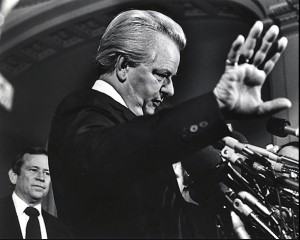Based on the same principles that limit presidents to two four-year terms, I believe senators should be limited to two six-year terms and representatives to five two-year terms. This is why I cannot join the chorus of those now eulogizing Senator Robert Byrd of West Virginia for becoming a veritable institution by holding on to his seat in the U.S. Senate for 51 years.
Seniority confers considerable powers and prerogatives upon senators. And no senator in history has used his seniority to wield more power and exercise more prerogatives than Byrd. In particular, he parlayed his decades as Chairman of the Appropriations Committee, which controls one-third of the $3 trillion federal budget, to direct billions of dollars in taxpayer money to fund projects to his home state. And such was his imperiousness in this respect that instead of recoiling at being called a pork-barrel politician, like most politicians do, Byrd embraced it:
One man’s pork is another man’s job. Pork has been good investment in West Virginia. You can look around and see what I’ve done.
(Byrd during a Senate floor debate, C-SPAN, 2001)
In fact, the reason one can readily see what he has done is that his state has named so many highways, schools, buildings and monuments in his honor that you’d think West Virginians regard Robert Byrd, not George Washington, as the father of this nation.
 But enough about what I did not like about this legendary senator, especially since all of this pales in comparison to what I liked about him. Indeed, I am proud to disclose that I have always hailed Byrd as my favorite senator.
But enough about what I did not like about this legendary senator, especially since all of this pales in comparison to what I liked about him. Indeed, I am proud to disclose that I have always hailed Byrd as my favorite senator.
Of course there are many reasons for this. Not least of which is that he never failed to proffer the most informed and authoritative arguments for all of his liberal views, all of which I share. In a similar vein, his colleagues often spoke in awe of his unparalleled understanding of arcane senate rules, his ability to quote the constitution verbatim, and his grasp of world history.
Bob is a living encyclopedia, and legislative graveyards are filled with the bones of those who underestimated him.
(former House Speaker Jim Wright, D-Texas, Associated Press, June 28, 2010)
Not to mention that he was probably the only senator in the history of this republic who would have been just as comfortable and influential on the floor of what is generally regarded as the greatest deliberative body ever known to mankind, the Senate of the ancient Roman republic.
And his inimitable oratory was never more poignant and inspiring than when he chastised his colleagues, including Hillary Clinton and John Kerry, for sacrificing their political principles at the altar of political expediency by supporting Bush’s invasion of Iraq. (For the record, Obama was not in the Senate when he first voiced opposition to this war. But if he were, it’s very like that he would have been among those getting a tongue lashing from Byrd on this issue….)
 Then there’s the fact that Byrd’s public redemption emulates that of Saul of Tarsus in the Bible – a text he quoted from almost as often as the Constitution in Senate debates. For the most defining feature of his public life is his conversion from Grand Wizard of the Ku Klux Klan to champion of black civil rights, which is saying a lot for a senator from a redneck state that is 96 percent white.
Then there’s the fact that Byrd’s public redemption emulates that of Saul of Tarsus in the Bible – a text he quoted from almost as often as the Constitution in Senate debates. For the most defining feature of his public life is his conversion from Grand Wizard of the Ku Klux Klan to champion of black civil rights, which is saying a lot for a senator from a redneck state that is 96 percent white.
Byrd was known for saying that he apologized a thousand times for his association with the Klan, and that he did not mind having to do so over and over again. But here is how he lamented this permanent stain on his extraordinary record of public service in his 2005 autobiography entitled Robert C. Byrd: Child of the Appalachian Coalfields:
[My membership in the KKK] has emerged throughout my life to haunt and embarrass me and has taught me in a very graphic way what one major mistake can do to one’s life, career, and reputation.
Appropriately enough, here, in part, is how President Obama paid tribute to him yesterday:
He had the courage to stand firm in his principles, but also the courage to change over time.
(President Obama, whitehouse.gov, June 28, 2010)
No doubt it constituted a sublime confluence of his political principles and conversion to cause of black civil rights when he endorsed Barack Obama (instead of any of the white Democratic candidates) for president of the United States as:
… a shining young statesman, who possesses the personal temperament and courage necessary to extricate our country from this costly misadventure in Iraq.
(Free Republic, May 8, 2008)
Byrd died yesterday at Inova Hospital in Fairfax, Virginia. He was 92.
Farewell, Senator.
Leave a Reply
You must be logged in to post a comment.